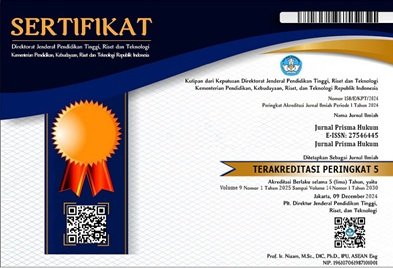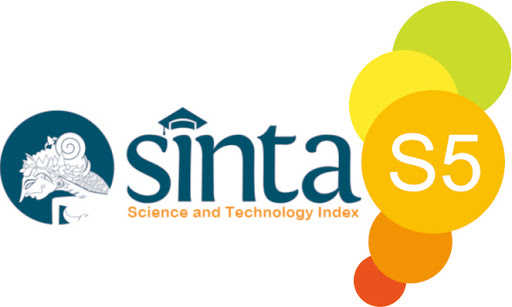PENERAPAN KEADILAN RESTORATIF PADA TINGKAT PENUNTUTAN PERKARA TINDAK PIDANA UMUM DALAM MEMENUHI ASAS KEADILAN DAN PENEGAKAN HUKUM MENURUT PERATURAN KEJAKSAAN NOMOR 15 TAHUN 2020 TENTANG PENGHENTIAN PENUNTUTAN BERDASARKAN KEADILAN RESTORATIF
Kata Kunci:
Keadilan Restoratif, Penghentian Penuntutan, Penegakan HukumAbstrak
Restorative justice merupakan suatu model pendekatan yang muncul pada era tahun 1960-an dalam upaya penyelesaian perkara tindak pidana, yang berbeda dengan pendekatan yang dipakai dalam sistem peradilan pidana konvensional, pendekatan ini menitikberatkan pada adanya partisipasi langsung pelaku tindak pidana, korban dan masyarakat dalam proses penyelesaian perkara pidana. Kewenangan berdasarkan asas dominus litis, membuat Kejaksaan pada tahun 2020 menetapkan Peraturan Kejaksaan Republik Indonesia Nomor 15 Tahun 2020. Tujuan penelitian adalah ntuk menganalisis penerapan keadilan restoratif perkara tindak pidana umum pada tingkat penuntutan dalam memenuhi asas keadilan dalam penegakan hukum. Metode pendekatan yang digunakan dalam penelitian ini adalah pendekatan yuridis normatif, yaitu penelitian hukum kepustakaan. Spesifikasi penelitian yang digunakan bersifat deskriptif analitis,. Hasil penelitian, Penerapan keadilan restoratif pada tingkat penuntutan dalam perkara tindak pidana umum sebagaimana diatur dalam Peraturan Kejaksaan RI Nomor 15 Tahun 2020 merupakan langkah progresif dalam pembaruan sistem peradilan pidana Indonesia yang menekankan pada pemulihan, bukan pembalasan. Pendekatan ini sejalan dengan asas ultimum remedium dan nilai-nilai Pancasila serta hukum progresif, karena mengedepankan penyelesaian konflik secara humanis, inklusif, dan partisipatif antara pelaku, korban, dan Masyarakat, sehingga tercipta keadilan, dalam penegakan hukumnya mencerminkan pergeseran paradigma penegakan hukum dari pendekatan yang represif menuju pendekatan yang lebih humanis, partisipatif, dan solutif. Melalui Peraturan Kejaksaan Republik Indonesia Nomor 15 Tahun 2020, jaksa diberikan kewenangan untuk menghentikan penuntutan berdasarkan prinsip keadilan restoratif, sepanjang terpenuhi syarat-syarat tertentu, seperti adanya perdamaian antara pelaku dan korban serta pemulihan kerugian. Pendekatan ini tidak hanya sesuai dengan semangat law as a tool of social engineering, tetapi juga sejalan dengan tujuan pemidanaan modern yang mengedepankan rehabilitasi, rekonsiliasi, dan pemulihan sosial.
Restorative justice is an approach model that emerged in the 1960s as an alternative method for resolving criminal cases, distinct from the conventional criminal justice system. This approach emphasizes the direct participation of offenders, victims, and the community in the process of settling criminal cases. Exercising its authority based on the dominus litis principle, the Indonesian Prosecutor's Office enacted Regulation of the Prosecutor's Office of the Republic of Indonesia Number 15 of 2020. The objective of this research is to analyze the implementation of restorative justice in general criminal cases at the prosecution stage in fulfilling the principle of justice in law enforcement. The research employs a normative juridical approach, which is a library-based legal research method. The research specification is descriptive-analytical. The findings indicate that the application of restorative justice at the prosecution stage in general criminal cases, as regulated in Prosecutor’s Regulation Number 15 of 2020, represents a progressive step in reforming Indonesia’s criminal justice system by prioritizing restoration over retribution. This approach aligns with the principle of ultimum remedium, the values of Pancasila, and progressive legal theories, as it promotes conflict resolution that is humanistic, inclusive, and participatory, engaging offenders, victims, and the community to achieve justice. In its enforcement, this approach signifies a paradigm shift from a repressive to a more humanistic, participatory, and solution-oriented model of law enforcement. Through this regulation, prosecutors are granted the authority to terminate prosecutions based on restorative justice principles, provided certain conditions are met, such as reconciliation between offender and victim and restitution of damages. This approach not only reflects the spirit of law as a tool of social engineering, but also aligns with modern penal objectives that prioritize rehabilitation, reconciliation, and social restoration.





